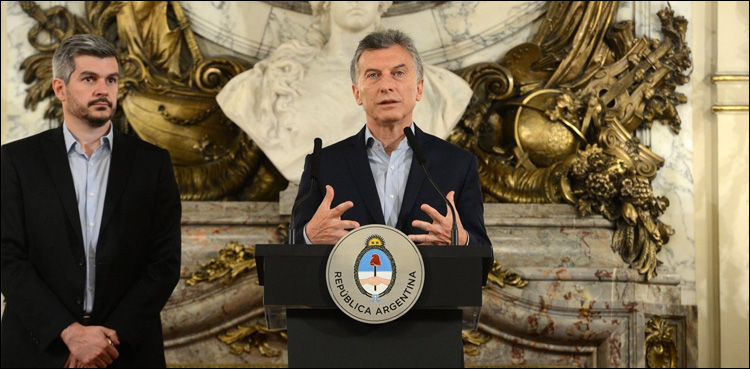BUENOS AIRES: Argentina’s president Mauricio Macri announced austerity measures on Monday, including the elimination of government ministries and stiff taxes on exports to reduce budget deficits and stabilise the economy.
The centre-right president admitted in a speech to the nation that Argentina was facing “an emergency.”
“We must confront a fundamental problem: to not spend more than we have, to make efforts to balance the state’s accounts,” he said in the televised address.
He pledged a pared-down government that would see the elimination of around half the current number of ministries in an effort to shed staff and tighten budgets.
Thousands of demonstrators took to the streets of Buenos Aires in protest against the government’s austerity programme.
Argentina is one of the world’s biggest exporters of corn and soy oil and Macri’s market-friendly approach had previously seen him cut taxes on major grain exporters.
Read More: Greece exits bailouts after biting austerity
“We ask those who have more capacity to contribute, those who export, that they make a greater contribution,” he said.
Addressing rich agricultural exporters who will now face increased export taxes, he said: “We know it’s a bad tax, but I ask you to understand that it’s an emergency.”
In a bid to reassure Argentines increasingly concerned over austerity, he said he would allocate more aid to the country’s poor, suffering from the effects of high inflation.
“We will overcome the crisis by taking care of the most needy,” promising “increased allocations, food programmes and price caps on some commodities.”
Several ministries will be eliminated, which will result in a decrease in budget and staff.
Economy Minister Nicolas Dujovne recognised in a press conference later that “mistakes had been made.”
New deficit pledge
Argentina has already pledged measures to cut the budget deficit to 1.3% of GDP in 2019, but Dujovne said it would now go further, to reduce its primary deficit — its borrowing needs before debt servicing — to zero next year.
“In 2019 we want to reach primary fiscal equilibrium, and by lowering the deficit we will lower our need to issue debt,” the minister said.
The current target for 2018 is 2.7% of GDP.
On the restored grain taxes, Dujovne said the tax would be temporary and would mean an extra $1.7bn in state coffers in 2018.
“We believe it is crucial that the country’s risk is lowered again,” he said.
Dujovne was speaking before flying to Washington for a meeting with the International Monetary Fund on Tuesday to finalise a deal to speed up disbursement of a $50bn loan agreed in June.
Macri last week unexpectedly announced Argentina would seek faster disbursement of its line of credit from the IMF.
Read More: PM begins austerity from his own
That set off alarm bells among investors, concerned Argentina will default on government borrowing, and triggered a run on the peso, which plunged 20% in two days.
The currency has lost half its value against the dollar since January.
The peso was trading at 38.32 to the dollar at opening on Monday, slightly down on Friday’s close.
A first $15bn tranche of the loan has largely gone to prop up the peso in recent months.
Argentina’s Central Bank hiked its baseline interest rate to 60% last week in a further bid to stabilise the currency.



Leave a Comment